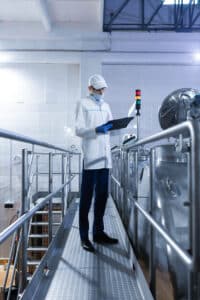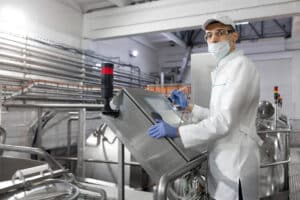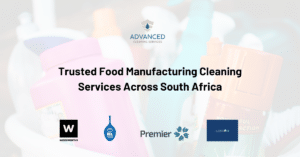Food safety audits are essential for guaranteeing food products’ quality and safety, safeguarding the public’s health, and encouraging industry accountability. Although obtaining a flawless audit score of 200 is relatively rare, many people want to achieve this standard of excellence.
“To score a 200, you’ve really got to be on top of your game, and we have managed to score a couple of two hundreds. We just recently received a 200 just the other day with one of our clients, which we are very proud of.”- Dean Lancaster, CEO.
With more than 25 years of expertise and an impeccable record in food safety audits, we at Advanced Cleaning Services have perfected our methods to assist food and beverage production facilities in achieving high marks in these evaluations.
Here’s how your facility can routinely receive high grades during food safety audits:
1. Treat Every Day as an Audit Day
“The best advice to be given to anyone in this environment is that every day should be a food safety audit day. And if you practice that, it becomes the culture of your approach to food safety and to manufacturing in an environment that is food safe.” – Dean Lancaster, CEO.
It is essential to always maintain high standards of cleanliness and safety because many audits are conducted without prior notice. Teach your staff how to conduct inspections with assurance and effectiveness. This includes acquainting them with the protocols for standard audit requirements like chemical dilution testing.
Food safety audit preparation shouldn’t be done only once. Rather, incorporate food safety into the culture of your plant and make it a daily priority. You may make audits less stressful and more bearable by considering every day as an audit day, which guarantees that the high standards needed for an audit become a regular part of your operations.
2. Go Beyond the 2.5-Meter Cleaning Standard
While the 2.5-meter level is frequently the highest point that cleaning supervisors reach, food safety shouldn’t be limited to that level. The buildup of contaminants on elevated surfaces, including above pipelines and structures, could compromise the safety of products. To consistently take care of these areas, use a top-down cleaning strategy. Make sure to completely clean all high-level surfaces, such as cable tracks and above pipes, to avoid any possible contamination.
3. Implement Rigorous Internal Audits
Maintaining and raising the bar for food safety standards requires regular internal audits. Create a thorough internal auditing process that aligns with the standards of external audits. This includes assessing cleaning personnel training, making sure that equipment and processes adhere to regulations, and assessing hygienic practices. Your team’s preparedness and competency should be evaluated through these internal audits, which will help them get ready for any unannounced inspections.
4. Maintain High Standards of Staff Training and Appearance
A key component of food safety is employee appearance and training. Make sure every employee has received the necessary training and is outfitted with the proper personal protective equipment (PPE). In order to prevent contamination and demonstrate a commitment to food safety, proper training and attention to worker appearance are essential during audits.
5. Regularly Update and Review Cleaning Protocols
Best practices and standards for food safety change over time, so it’s crucial to stay current on the most recent demands from the sector. Review and update your cleaning procedures on a regular basis to conform to new guidelines and regulations. This continuous process guarantees that your protocols are up to date and in compliance with food safety laws.
How Advanced Cleaning Services Can Assist
Our mission at Advanced Cleaning Services is to safeguard brands and we assist our clients in attaining exceptional audit outcomes. We follow a strict internal auditing procedure whereby our area managers visit locations and do in-depth inspections using a comprehensive checklist. This guarantees that our services consistently meet the highest standards and are in line with our service level agreements.
Through the implementation of these tactics and the utilisation of our specialised knowledge, your manufacturing facility will be highly capable of succeeding in food safety inspections and upholding an impeccable record of compliance.
Contact us today!



